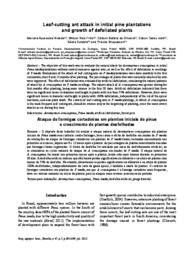Leaf-cutting ant attack in initial pine plantations and growth of defoliated plants.
Leaf-cutting ant attack in initial pine plantations and growth of defoliated plants.
Author(s): NICKELE, M. A.; REIS FILHO, W.; OLIVEIRA, E. B. de; IEDE, E. T.; CALDATO, N.; STRAPASON, P.
Summary: The objective of this work was to evaluate the natural attack by Acromyrmex crassispinus in initial Pinus taeda plantations without control measures against ants, as well as the effect of defoliation in seedlings of P. taeda. Evaluations of the attack of leaf?cutting ants on P. taeda plantations were done monthly in the first six months, then 9 and 12 months after planting. The percentages of plants that were naturally attacked by ants were registered. The effect of defoliation was evaluated by artificial defoliation, simulating the natural patterns of attack by A. crassispinus on P. taeda seedlings. The natural attack of A. crassispinus was greater during the first months after planting, being more intense in the first 30 days. Artificial defoliation indicated that there were no significant losses in diameter and height in plants with less than 75% defoliation. However, there were significant losses in diameter and height in plants with 100% defoliation, independently of the cut of the apical meristem, and also plant death. The control of leaf?cutting ants in P. taeda plantings, in which A. crassispinus is the most frequent leaf?cutting ant, should be intense only at the beginning of planting, since the most severe attacks occur during this time.
Publication year: 2012
Types of publication: Journal article
Unit: Embrapa Forestry
Observation
Some of Embrapa's publications are published as ePub files. To read them, use or download one of the following free software options to your computer or mobile device. Android: Google Play Books; IOS: iBooks; Windows and Linux: Calibre.
Access other publications
Access the Agricultural Research Database (BDPA) to consult Embrapa's full library collection and records.
Visit Embrapa Bookstore to purchase books and other publications sold by Embrapa.

